-ice
(Latin: a suffix that forms nouns; meaning, quality of, state of)
1. An associate in wrongdoing; especially, someone who helps or encourages another person in a criminal act, either as a principal participant or as an accessory: The internet accomplices were very clever and quick to fool the football player into believing that a girl had fallen in love with him.
2. Etymology: from Late Latin complex, complic, "allied"; from com- "together" + the root of plicare, "to fold".
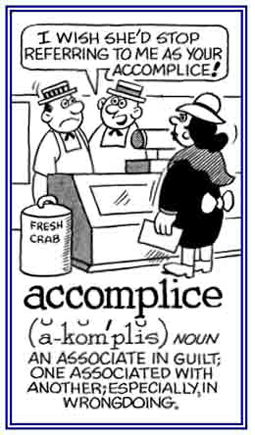
© ALL rights are reserved.
Go to this Word A Day Revisited Index
2. Etymology: from Late Latin complex, complic, "allied"; from com- "together" + the root of plicare, "to fold".

Go to this Word A Day Revisited Index
so you can see more of Mickey Bach's cartoons.
1. Someone who is bound by a legal agreement to serve another person for a fixed period of time in order to learn a trade or a business: The apprentice of the silversmith had signed a four-year agreement to work and to learn how to develop skills in making articles out of silver as a professional craftsman.
2. Any learner or beginner: Sam's pet was an apprentice that was learning to be a "seeing-eye dog" for his blind daughter.
3. Etymology: from Old French aprentiz, "someone learning", from aprendre, (Modern French apprendre) "to learn, to teach"; contracted from Latin apprehendere, "to take hold of, to grasp"; from ad-, "to" + prehendere, "to seize".
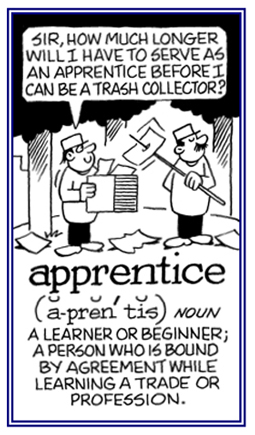
© ALL rights are reserved.
Go to this Word A Day Revisited Index
2. Any learner or beginner: Sam's pet was an apprentice that was learning to be a "seeing-eye dog" for his blind daughter.
3. Etymology: from Old French aprentiz, "someone learning", from aprendre, (Modern French apprendre) "to learn, to teach"; contracted from Latin apprehendere, "to take hold of, to grasp"; from ad-, "to" + prehendere, "to seize".

Go to this Word A Day Revisited Index
so you can see more of Mickey Bach's cartoons.
1. A formal agreement to temporarily end military fighting by mutual consent; a truce: For the holiday the opponents decided on an armistice and both sides wanted peace talks in hopes of ending the conflict.
2. Etymology: from French armistice, coined on the model of Latin solstitium, from Latin arma, "arms" + -stitium which is from Latin sistere, "to cause to stand, to come to a stop, to make stand still".
2. Etymology: from French armistice, coined on the model of Latin solstitium, from Latin arma, "arms" + -stitium which is from Latin sistere, "to cause to stand, to come to a stop, to make stand still".
1. An artful or crafty device; a stratagem: The artifice used by the salesman was intended to trick and to ensnare other people into buying his products.
2. A subtle but base deception; trickery: Ben's story was just an artifice to win sympathy from his colleagues.
3. Cleverness or skill; ingenuity: People need artifices to get others to participate in certain activities or to do something.
4. Etymology: borrowed from Old French meaning "craftsmanship"; from Latin artificium, "trade, craft"; from artifex, "craftsman".
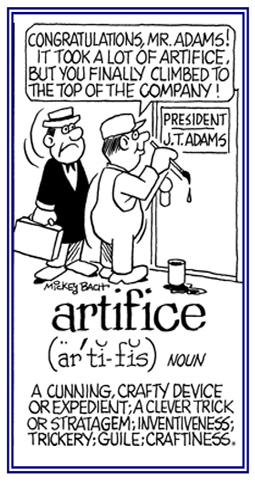
© ALL rights are reserved.

© ALL rights are reserved.
Go to this Word A Day Revisited Index
2. A subtle but base deception; trickery: Ben's story was just an artifice to win sympathy from his colleagues.
3. Cleverness or skill; ingenuity: People need artifices to get others to participate in certain activities or to do something.
4. Etymology: borrowed from Old French meaning "craftsmanship"; from Latin artificium, "trade, craft"; from artifex, "craftsman".
A compound construction from ar(t)s, "art, craft" +-fex, fic-, "maker" from facere, "to make".


Go to this Word A Day Revisited Index
so you can see more of Mickey Bach's cartoons.
1. An insatiable greed for riches or a miserly desire to gain and hoard wealth: There are some people who are convinced that the corporate world consists of people who have a strong urge for avarice and power.
2. An excessive desire for gain; greediness after wealth; covetousness; cupidity: Paul's avarice apparently led him into unethical business deals.
3. Etymology: via French from Latin avaritia, "greedy"; from avere, "to desire".

© ALL rights are reserved.
Go to this Word A Day Revisited Index
2. An excessive desire for gain; greediness after wealth; covetousness; cupidity: Paul's avarice apparently led him into unethical business deals.
3. Etymology: via French from Latin avaritia, "greedy"; from avere, "to desire".

Go to this Word A Day Revisited Index
for a list of additional Mickey Bach illustrations.
An ecclesiastical term referring to the paid position for a member of the clergy attached to a church, typically by way of an endowment to the church: Fredrick studied hard at the theological institute hoping to receive a benefice at the church where he grew up.
dentifrice
A powder or other preparation for rubbing or cleansing the teeth; a tooth-powder or tooth-paste; also applied to liquid preparations.
1. A building, especially one of imposing appearance or size.
2. An elaborate conceptual structure or concept on which to build a theory or process.
3. Any large, complex system, or organization.
4. A system which has been established for a long time: "It looks as if the whole political edifice of our country is about to collapse."
2. An elaborate conceptual structure or concept on which to build a theory or process.
3. Any large, complex system, or organization.
4. A system which has been established for a long time: "It looks as if the whole political edifice of our country is about to collapse."
fellatrice
hospice
1. Violation of another's rights or of what is right; lack of justice.
2. A specific unjust act; a wrong.
3. A violation of a person's rights; unfair treatment of another person or other people.
4. An unjust or unfair act; wrong.
2. A specific unjust act; a wrong.
3. A violation of a person's rights; unfair treatment of another person or other people.
4. An unjust or unfair act; wrong.
1. A very narrow crevice or space between parts or things: Jane left an interstice between the shades in her bedroom in order to enjoy the sunshine peeking though.
2. A short gap of time between activities: Mrs. Robinson used the interstices of her breaks at her desk to call up her daughter.
2. A short gap of time between activities: Mrs. Robinson used the interstices of her breaks at her desk to call up her daughter.
1. An improper treatment or a culpable neglect of a patient by a physician: The surviving kin of Marcus charged the doctor with malpractice because they were convinced that their relative had died because of an improper diagnosis.
2. Illegal action by which a person seeks to benefit himself or herself at the cost of others while in a position of trust: The international organization which was investigating allegations of rigged elections concluded there had been a series of malpractices which invalidated the results of the election.
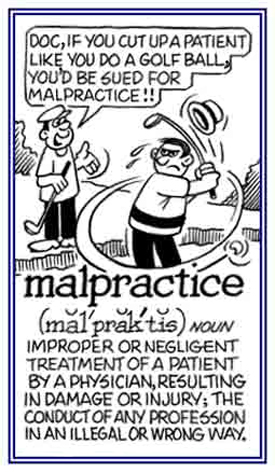
© ALL rights are reserved.
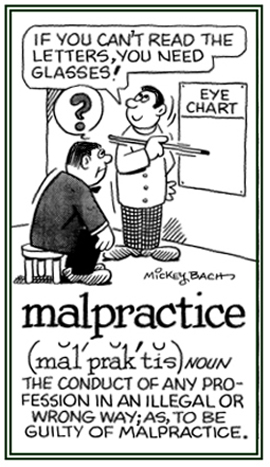
© ALL rights are reserved.
Go to this Word A Day Revisited Index
2. Illegal action by which a person seeks to benefit himself or herself at the cost of others while in a position of trust: The international organization which was investigating allegations of rigged elections concluded there had been a series of malpractices which invalidated the results of the election.


Go to this Word A Day Revisited Index
so you can see more of Mickey Bach's cartoons.
orifice
1. An aperture, or hole, opening into a bodily cavity.
2. The entrance, or outlet, of any body cavity.
3. An opening, especially the mouth, anus, vagina, or other opening into a cavity or passage in the body.
2. The entrance, or outlet, of any body cavity.
3. An opening, especially the mouth, anus, vagina, or other opening into a cavity or passage in the body.
1. An overhanging or extremely steep mass of rock, such as a crag or the face of a cliff: The hikers drew back carefully from the precipice, moving towards safety.
2. The brink of a dangerous or disastrous situation: The school team was on the precipice of defeat.
2. The brink of a dangerous or disastrous situation: The school team was on the precipice of defeat.
Before he found out the results of his final examinations, Samuel felt as though he were at the edge of a precipice.
3. Etymology: from "fall to great depth"; from French précipice, from Latin præcipitium, "a steep place"; literally, "a fall" or "leap"; from præceps, præcipitis, "steep, headlong, headfirst"; from prae-, "in front" + caput, "head".
The meaning of "steep face of rock" is recorded from 1632.
Showing page 1 out of 2 pages of 20 main-word entries or main-word-entry groups.

